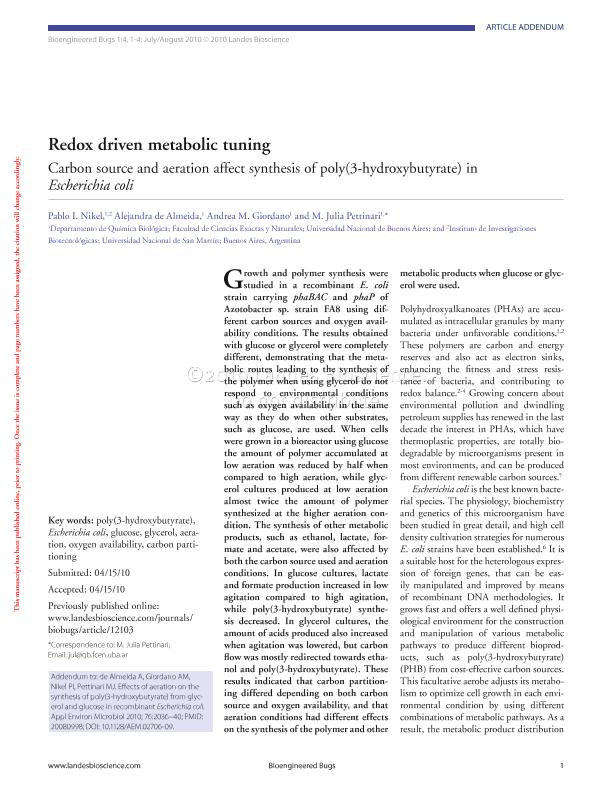Mostrar el registro sencillo del ítem
dc.contributor.author
de Almeida, Alejandra

dc.contributor.author
Giordano, Andrea Mariana

dc.contributor.author
Nikel, Pablo Ivan

dc.contributor.author
Pettinari, María Julia

dc.date.available
2019-01-23T14:07:04Z
dc.date.issued
2014-10
dc.identifier.citation
de Almeida, Alejandra; Giordano, Andrea Mariana; Nikel, Pablo Ivan; Pettinari, María Julia; Redox driven metabolic tuning; American Society for Microbiology; Bioengineered Bugs; 1; 4; 10-2014; 293-297
dc.identifier.issn
1949-1026
dc.identifier.uri
http://hdl.handle.net/11336/68436
dc.description.abstract
Growth and polymer synthesis were studied in a recombinant E. coli strain carrying phaBAC and phaP of Azotobacter sp. strain FA8 using different carbon sources and oxygen availability conditions. The results obtained with glucose or glycerol were completely different, demonstrating that the metabolic routes leading to the synthesis of the polymer when using glycerol do not respond to environmental conditions such as oxygen availability in the same way as they do when other substrates, such as glucose, are used. When cells were grown in a bioreactor using glucose the amount of polymer accumulated at low aeration was reduced by half when compared to high aeration, while glycerol cultures produced at low aeration almost twice the amount of polymer synthesized at the higher aeration condition. The synthesis of other metabolic products, such as ethanol, lactate, formate and acetate, were also affected by both the carbon source used and aeration conditions. In glucose cultures, lactate and formate production increased in low agitation compared to high agitation, while poly(3-hydroxybutyrate) synthesis decreased. In glycerol cultures, the amount of acids produced also increased when agitation was lowered, but carbon flow was mostly redirected towards ethanol and poly(3-hydroxybutyrate). These results indicated that carbon partitioning differed depending on both carbon source and oxygen availability, and that aeration conditions had different effects on the synthesis of the polymer and other metabolic products when glucose or glycerol were used.
dc.format
application/pdf
dc.language.iso
eng
dc.publisher
American Society for Microbiology

dc.rights
info:eu-repo/semantics/openAccess
dc.rights.uri
https://creativecommons.org/licenses/by-nc-sa/2.5/ar/
dc.subject
Poly(3-Hydroxybutyrate)
dc.subject
Escherichia Coli
dc.subject
Glucose
dc.subject
Glycerol
dc.subject
Aeration
dc.subject
Oxygen Availability
dc.subject
Carbon Partitioning
dc.subject.classification
Otras Ciencias Biológicas

dc.subject.classification
Ciencias Biológicas

dc.subject.classification
CIENCIAS NATURALES Y EXACTAS

dc.title
Redox driven metabolic tuning
dc.type
info:eu-repo/semantics/article
dc.type
info:ar-repo/semantics/artículo
dc.type
info:eu-repo/semantics/publishedVersion
dc.date.updated
2019-01-22T18:52:46Z
dc.journal.volume
1
dc.journal.number
4
dc.journal.pagination
293-297
dc.journal.pais
Estados Unidos

dc.description.fil
Fil: de Almeida, Alejandra. Universidad de Buenos Aires. Facultad de Ciencias Exactas y Naturales. Departamento de Química Biológica; Argentina. Consejo Nacional de Investigaciones Científicas y Técnicas. Centro Científico Tecnológico Conicet - La Plata. Instituto de Investigaciones Biotecnológicas. Universidad Nacional de San Martín. Instituto de Investigaciones Biotecnológicas; Argentina
dc.description.fil
Fil: Giordano, Andrea Mariana. Universidad de Buenos Aires. Facultad de Ciencias Exactas y Naturales. Departamento de Química Biológica; Argentina
dc.description.fil
Fil: Nikel, Pablo Ivan. Universidad de Buenos Aires. Facultad de Ciencias Exactas y Naturales. Departamento de Química Biológica; Argentina. Consejo Nacional de Investigaciones Científicas y Técnicas; Argentina
dc.description.fil
Fil: Pettinari, María Julia. Universidad de Buenos Aires. Facultad de Ciencias Exactas y Naturales. Departamento de Química Biológica; Argentina. Consejo Nacional de Investigaciones Científicas y Técnicas; Argentina
dc.journal.title
Bioengineered Bugs

dc.relation.alternativeid
info:eu-repo/semantics/altIdentifier/doi/http://dx.doi.org/10.4161/bbug.1.4.12103
dc.relation.alternativeid
info:eu-repo/semantics/altIdentifier/url/https://www.tandfonline.com/doi/abs/10.4161/bbug.1.4.12103
dc.relation.alternativeid
info:eu-repo/semantics/altIdentifier/url/https://www.ncbi.nlm.nih.gov/pmc/articles/PMC3026471/
Archivos asociados
